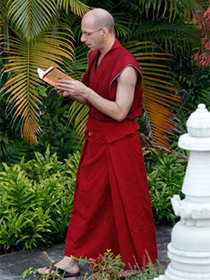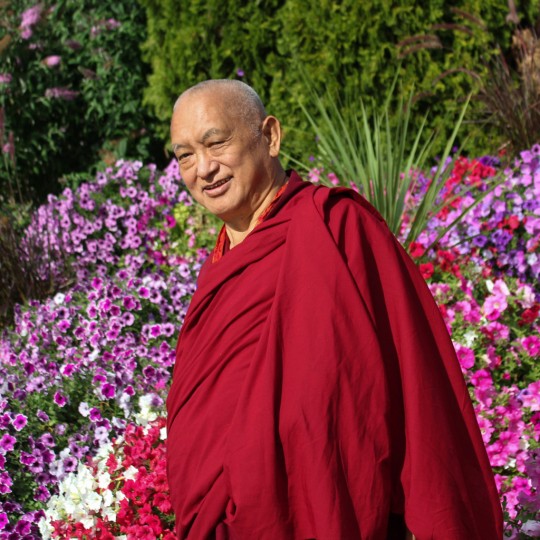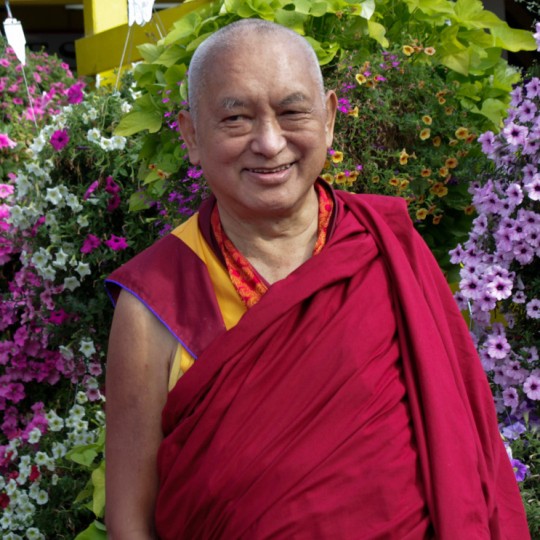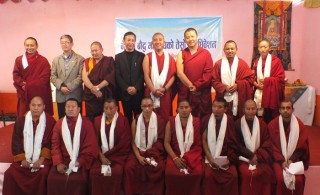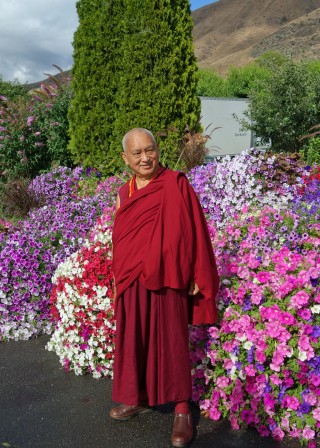- Home
- FPMT Homepage
Foundation for the Preservation of the Mahayana Tradition
The FPMT is an organization devoted to preserving and spreading Mahayana Buddhism worldwide by creating opportunities to listen, reflect, meditate, practice and actualize the unmistaken teachings of the Buddha and based on that experience spreading the Dharma to sentient beings. We provide integrated education through which people’s minds and hearts can be transformed into their highest potential for the benefit of others, inspired by an attitude of universal responsibility and service. We are committed to creating harmonious environments and helping all beings develop their full potential of infinite wisdom and compassion. Our organization is based on the Buddhist tradition of Lama Tsongkhapa of Tibet as taught to us by our founders Lama Thubten Yeshe and Lama Thubten Zopa Rinpoche.
- Willkommen
Die Stiftung zur Erhaltung der Mahayana Tradition (FPMT) ist eine Organisation, die sich weltweit für die Erhaltung und Verbreitung des Mahayana-Buddhismus einsetzt, indem sie Möglichkeiten schafft, den makellosen Lehren des Buddha zuzuhören, über sie zur reflektieren und zu meditieren und auf der Grundlage dieser Erfahrung das Dharma unter den Lebewesen zu verbreiten.
Wir bieten integrierte Schulungswege an, durch denen der Geist und das Herz der Menschen in ihr höchstes Potential verwandelt werden zum Wohl der anderen – inspiriert durch eine Haltung der universellen Verantwortung und dem Wunsch zu dienen. Wir haben uns verpflichtet, harmonische Umgebungen zu schaffen und allen Wesen zu helfen, ihr volles Potenzial unendlicher Weisheit und grenzenlosen Mitgefühls zu verwirklichen.
Unsere Organisation basiert auf der buddhistischen Tradition von Lama Tsongkhapa von Tibet, so wie sie uns von unseren Gründern Lama Thubten Yeshe und Lama Thubten Zopa Rinpoche gelehrt wird.
- Bienvenidos
La Fundación para la preservación de la tradición Mahayana (FPMT) es una organización que se dedica a preservar y difundir el budismo Mahayana en todo el mundo, creando oportunidades para escuchar, reflexionar, meditar, practicar y actualizar las enseñanzas inconfundibles de Buda y en base a esa experiencia difundir el Dharma a los seres.
Proporcionamos una educación integrada a través de la cual las mentes y los corazones de las personas se pueden transformar en su mayor potencial para el beneficio de los demás, inspirados por una actitud de responsabilidad y servicio universales. Estamos comprometidos a crear ambientes armoniosos y ayudar a todos los seres a desarrollar todo su potencial de infinita sabiduría y compasión.
Nuestra organización se basa en la tradición budista de Lama Tsongkhapa del Tíbet como nos lo enseñaron nuestros fundadores Lama Thubten Yeshe y Lama Zopa Rinpoche.
A continuación puede ver una lista de los centros y sus páginas web en su lengua preferida.
- Bienvenue
L’organisation de la FPMT a pour vocation la préservation et la diffusion du bouddhisme du mahayana dans le monde entier. Elle offre l’opportunité d’écouter, de réfléchir, de méditer, de pratiquer et de réaliser les enseignements excellents du Bouddha, pour ensuite transmettre le Dharma à tous les êtres. Nous proposons une formation intégrée grâce à laquelle le cœur et l’esprit de chacun peuvent accomplir leur potentiel le plus élevé pour le bien d’autrui, inspirés par le sens du service et une responsabilité universelle. Nous nous engageons à créer un environnement harmonieux et à aider tous les êtres à épanouir leur potentiel illimité de compassion et de sagesse. Notre organisation s’appuie sur la tradition guéloukpa de Lama Tsongkhapa du Tibet, telle qu’elle a été enseignée par nos fondateurs Lama Thoubtèn Yéshé et Lama Zopa Rinpoché.
Visitez le site de notre Editions Mahayana pour les traductions, conseils et nouvelles du Bureau international en français.
Voici une liste de centres et de leurs sites dans votre langue préférée
- Benvenuto
L’FPMT è un organizzazione il cui scopo è preservare e diffondere il Buddhismo Mahayana nel mondo, creando occasioni di ascolto, riflessione, meditazione e pratica dei perfetti insegnamenti del Buddha, al fine di attualizzare e diffondere il Dharma fra tutti gli esseri senzienti.
Offriamo un’educazione integrata, che può trasformare la mente e i cuori delle persone nel loro massimo potenziale, per il beneficio di tutti gli esseri, ispirati da un’attitudine di responsabilità universale e di servizio.
Il nostro obiettivo è quello di creare contesti armoniosi e aiutare tutti gli esseri a sviluppare in modo completo le proprie potenzialità di infinita saggezza e compassione.
La nostra organizzazione si basa sulla tradizione buddhista di Lama Tsongkhapa del Tibet, così come ci è stata insegnata dai nostri fondatori Lama Thubten Yeshe e Lama Zopa Rinpoche.
Di seguito potete trovare un elenco dei centri e dei loro siti nella lingua da voi prescelta.
- 欢迎 / 歡迎
简体中文
“护持大乘法脉基金会”( 英文简称:FPMT。全名:Foundation for the Preservation of the Mahayana Tradition) 是一个致力于护持和弘扬大乘佛法的国际佛教组织。我们提供听闻,思维,禅修,修行和实证佛陀无误教法的机会,以便让一切众生都能够享受佛法的指引和滋润。
我们全力创造和谐融洽的环境, 为人们提供解行并重的完整佛法教育,以便启发内在的环宇悲心及责任心,并开发内心所蕴藏的巨大潜能 — 无限的智慧与悲心 — 以便利益和服务一切有情。
FPMT的创办人是图腾耶喜喇嘛和喇嘛梭巴仁波切。我们所修习的是由两位上师所教导的,西藏喀巴大师的佛法传承。
繁體中文
護持大乘法脈基金會”( 英文簡稱:FPMT。全名:Found
ation for the Preservation of the Mahayana Tradition ) 是一個致力於護持和弘揚大乘佛法的國際佛教組織。我們提供聽聞, 思維,禪修,修行和實證佛陀無誤教法的機會,以便讓一切眾生都能 夠享受佛法的指引和滋潤。 我們全力創造和諧融洽的環境,
為人們提供解行並重的完整佛法教育,以便啟發內在的環宇悲心及責 任心,並開發內心所蘊藏的巨大潛能 — 無限的智慧與悲心 – – 以便利益和服務一切有情。 FPMT的創辦人是圖騰耶喜喇嘛和喇嘛梭巴仁波切。
我們所修習的是由兩位上師所教導的,西藏喀巴大師的佛法傳承。 察看道场信息:
- FPMT Homepage
- News/Media
-
- Study & Practice
-
-
- About FPMT Education Services
- Latest News
- Programs
- New to Buddhism?
- Buddhist Mind Science: Activating Your Potential
- Heart Advice for Death and Dying
- Discovering Buddhism
- Living in the Path
- Exploring Buddhism
- FPMT Basic Program
- FPMT Masters Program
- FPMT In-Depth Meditation Training
- Maitripa College
- Lotsawa Rinchen Zangpo Translator Program
- Universal Education for Compassion & Wisdom
- Online Learning Center
-
- Prayers & Practice Materials
- Overview of Prayers & Practices
- Full Catalogue of Prayers & Practice Materials
- Explore Popular Topics
- Benefiting Animals
- Chenrezig Resources
- Death & Dying Resources
- Lama Chopa (Guru Puja)
- Lama Zopa Rinpoche: Compendium of Precious Instructions
- Lama Zopa Rinpoche: Life Practice Advice
- Lama Zopa Rinpoche Practice Series
- Lamrim Resources
- Mantras
- Prayer Book Updates
- Purification Practices
- Sutras
- Thought Transformation (Lojong)
- Audio Materials
- Dharma Dates - Tibetan Calendar
- Translation Services
- Publishing Services
- Ways to Offer Support
- Prayers & Practice Materials
-
- Teachings and Advice
- Find Teachings and Advice
- Lama Zopa Rinpoche Advice Page
- Lama Zopa Rinpoche: Compendium of Precious Instructions
- Lama Zopa Rinpoche Video Teachings
- ༧སྐྱབས་རྗེ་བཟོད་པ་རིན་པོ་ཆེ་མཆོག་ནས་སྩལ་བའི་བཀའ་སློབ་བརྙན་འཕྲིན།
- Podcasts
- Lama Yeshe Wisdom Archive
- Buddhism FAQ
- Dharma for Young People
- Resources on Holy Objects
- Teachings and Advice
-
-
*If a menu item has a submenu clicking once will expand the menu clicking twice will open the page.
-
-
- Centers
-
- Teachers
-
- Projects
-
-
-
-
*If a menu item has a submenu clicking once will expand the menu clicking twice will open the page.
-
-
- FPMT
-
-
-
-
-
From the Buddhist point of view, attachment for something means that it’s very difficult for us to separate from it. We have a very strong attachment – strong like iron – for the things we think of as being very good. We need to learn to be flexible.
Lama Thubten Yeshe
-
-
-
- Shop
-
-
-
The Foundation Store is FPMT’s online shop and features a vast selection of Buddhist study and practice materials written or recommended by our lineage gurus. These items include homestudy programs, prayers and practices in PDF or eBook format, materials for children, and other resources to support practitioners.
Items displayed in the shop are made available for Dharma practice and educational purposes, and never for the purpose of profiting from their sale. Please read FPMT Foundation Store Policy Regarding Dharma Items for more information.
-
-
Lama Zopa Rinpoche News
13
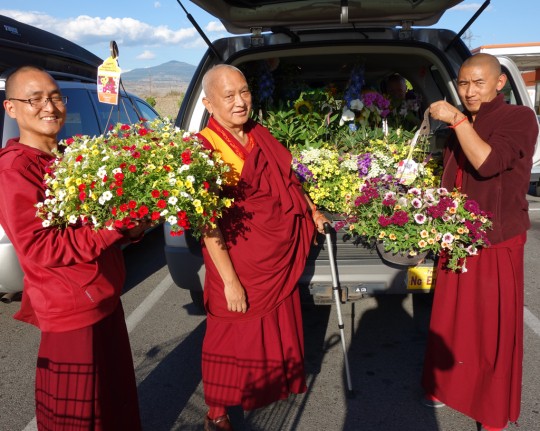
Lama Zopa Rinpoche after shopping for flowers for offering with Vens. Sherab and Sangpo, Washington, US, July 2014. Photo by Ven. Roger Kunsang.
“In the lam-rim, or graduated path to enlightenment, the first meditation outline is the root of the path: how to devote to the virtuous friend. Why is guru devotion the root of the path to enlightenment? Enlightenment is like a ripe fruit, the path to enlightenment is like the trunk of a tree, and guru devotion is like the root of the tree. From the root of guru devotion, the trunk of the path grows in our mind and bears the fruit of enlightenment. Whether or not we can start to develop the path to enlightenment in our mind in this life is determined by our practice of guru devotion,” Lama Zopa Rinpoche teaches in The Heart of the Path.
“Proper devotion to the guru, or virtuous friend, is the root of all success, from success in this life up to enlightenment, just as the trunk, branches, leaves and fruit of a tree depend upon its root. Or we can think that guru devotion is like the fuel in a car or a plane, without which the vehicle cannot take us where we want to go. Without guru devotion, nothing happens – no realizations, no liberation, no enlightenment – just as without the root of a tree there can be no trunk, branches, leaves, or fruit. Everything, up to enlightenment, depends on guru devotion.
“Guru devotion is the root not only of ultimate success, achieving full enlightenment and bringing sentient beings to the ultimate happiness of liberation and enlightenment, but also of temporary success and happiness. This practice is the foundation of the development of the whole path to enlightenment, as well as the foundation of all happiness. Since everything comes from the practice of guru devotion, it is called the root of the path. …”
You can read more in this excerpt from “Why Do We Need a Guru?,” the first chapter of the book The Heart of the Path: Seeing the Guru as Buddha by Lama Zopa Rinpoche, published by the Lama Yeshe Wisdom Archive.
Learn more about FPMT spiritual director Lama Zopa Rinpoche and his beneficial activities by visiting Rinpoche’s homepage, where you will find links to Rinpoche’s schedule, new advice, recent video, photos and more.
- Tagged: guru devotion, lam-rim, lama zopa rinpoche
- 0
“The Medicine Buddha encompasses all the buddhas. This means that when we practice the seven-limb prayer and make offerings with the seven limbs, we receive the same merit as we would if we had made offerings to all the buddhas. Similarly, when we recite the mantra of Medicine Buddha, we collect unbelievable merit just as when we offer the seven-limb practice to Medicine Buddha,” Lama Zopa Rinpoche teaches in “The Benefits of Medicine Buddha Practice.”
“To recite the Medicine Buddha mantra brings inconceivable merit. Manjushri requested the eight tathagatas (Guru Shakyamuni Buddha and the seven Medicine Buddhas) to reveal a special mantra that would make the prayers they (the eight tathagatas) made in the past (prayers to be able to actualize the happiness of sentient beings by attaining the path to enlightenment and pacifying various problems, to be able to see all the buddhas, and for all wishes to be quickly realized) to quickly come to pass, especially for those sentient beings born in the time of the five degenerations who have small merit and who are possessed and overwhelmed by various diseases and spirit harms.
“During that time, all the eight tathagatas, in one voice, taught the Medicine Buddha mantra. Therefore, if you recite the mantra every day, the buddhas and bodhisattvas will always pay attention to you, and they will guide you. Vajrapani, owner of the secrets, and the four guardians will always protect and guide you. All your negative karmas will be pacified, and you will never be born in the three lower realms. Even just hearing a recitation of the names of the eight tathagatas pacifies all diseases and spirit harms – even spirit harms that arise as a condition of disease – and all your wishes are fulfilled. …”
From the FPMT Education Services’ booklet “The Benefits of Medicine Buddha Practice” by Lama Zopa Rinpoche. For more on Medicine Buddha, see “Medicine Buddha Practice for Sickness and Poor Health.”
More information, photos and updates about FPMT spiritual director Lama Zopa Rinpoche can be found on Rinpoche’s homepage. If you’d like to receive news of Lama Zopa Rinpoche via email, sign up to Lama Zopa Rinpoche News.
- Tagged: lama zopa rinpoche, medicine buddha
- 0
8
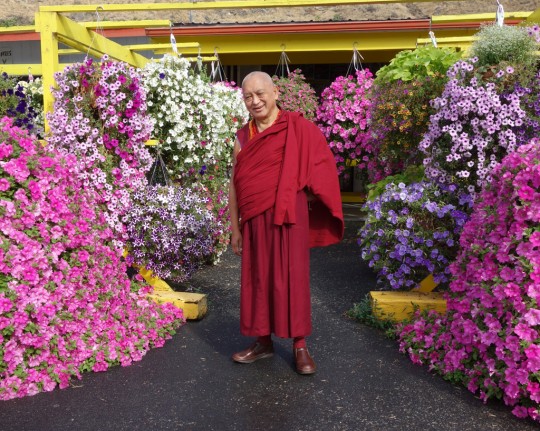
Lama Zopa Rinpoche shopping for flowers for offerings, Washington, US, July 2014. Photo by Ven. Roger Kunsang.
“People get excited about strange things. I recently saw a group of men kicking a ball into a big net between two sticks and hundreds of thousands of people were cheering and throwing their hands up in the air, while millions watched on television. Everybody was totally out of control with excitement. In fact, their faces were so distorted I couldn’t tell whether they were very happy or in great pain. This World Cup seems extremely important to many people, but it also brings misery and jealousy, as well as anger and hatred when your country beats my country,” Lama Zopa Rinpoche taught in the first chapter of The Perfect Human Rebirth: Freedom and Richness on the Path to Enlightenment.
“On the other hand, a real cause for excitement and happiness is simply having this human body. If we could truly understand even a tiny part of its value, we would have a million times more reason for jumping in the air and shouting for joy the way those soccer fans do. Every day – every second – we should have a huge feeling of joy in our hearts that we have this precious possession that gives us the opportunity to do whatever we want. With it, we can achieve anything we want, to benefit ourselves and to benefit others.
“In sports and in worldly activities, people are always chasing the best and trying to be first in whatever they do. But winning at the Olympics, climbing Mount Everest, whatever people consider to be a great achievement, is really nothing. We have all done this kind of thing innumerable times, in past lives if not in this one, and it certainly hasn’t made us any happier.
“In fact, in our countless previous lives we have enjoyed every kind of pleasure innumerable times. We have achieved states we can’t even imagine. There is no new pleasure or experience that we have never had. We have been born in god realms where there is no overt suffering at all. We have achieved great powers of concentration, a concentration so profound that, as the great master Pabongka Dechen Nyingpo explains in his commentary on The Three Principal Aspects of the Path to Enlightenment, even a big drum beating right next to our ear could not disturb us. And we have even attained high psychic powers such as clairvoyance and the ability to fly. None of this is new. Such things seem special only because we don’t understand reincarnation and therefore don’t realize that in our beginningless previous lives we have done it all over and over again. …”
You can read more of this excerpt from “What is Dharma?” the first chapter of The Perfect Human Rebirth: Freedom and Richness on the Path to Enlightenment by Lama Zopa Rinpoche, on the Lama Yeshe Wisdom Archive website.
Learn more about FPMT spiritual director Lama Zopa Rinpoche and his beneficial activities by visiting Rinpoche’s homepage, where you will find links to Rinpoche’s schedule, new advice, recent video, photos and more.
- Tagged: lam-rim, lama zopa rinpoche, perfect human rebirth
- 0
7
“Why retreat on the lam-rim? Because of every single teaching of Buddha, of all three vehicles, even one syllable appears as an instruction, as the practice of one person to achieve enlightenment. Not even one syllable should be left out of Buddha’s teachings. The main goal of every single word of Buddha is to tame the mind, because your heart and mind is the creator of all the suffering of samsara, including the three lower realms. So when you transform your heart, you are the creator of your happiness and peace, liberation and enlightenment,” Lama Zopa Rinpoche wrote to students of FPMT’s Basic Program.
“Why specifically lam-rim retreat? Because it has a very special presentation to subdue the mind. The cause of all suffering of all sentient beings, from where all the suffering and problems come from, now and in the future, is the mind. If you analyze throughout your life, you will see this clearly. You can also understand this from what Buddha said:
“Do not engage in any harmful actions;
Perform only those that are good;
Subdue your own mind —
This is the teaching of the Buddha.
“Whatever you do, if it does not subdue the delusions, it is not Dharma.”
You can read more from “Benefits of Retreat on Lam-rim” by Lama Zopa Rinpoche and other advice on the “Advice from Lama Zopa Rinpoche” page.
More information, photos and updates about FPMT spiritual director Lama Zopa Rinpoche can be found on Rinpoche’s homepage. If you’d like to receive news of Lama Zopa Rinpoche via email, sign up to Lama Zopa Rinpoche News.
- Tagged: advice, lam-rim, lama zopa rinpoche
- 0
6
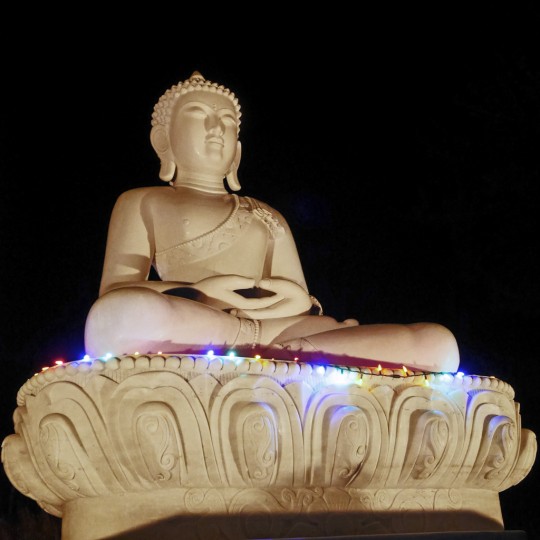
A statue of Amitabha Buddha carved from the highest quality marble and newly situated at Buddha Amitabha Pure Land, Washington, US, July 2014. Photo by Ven. Roger Kunsang.
A nun wrote to Lama Zopa Rinpoche with questions about practice and expressing her concern at not being able to find time to study and do her practice commitments while she was working at a Dharma center. Here’s part of Rinpoche’s response:
“… The whole essence to making decisions in life is to analyze according to the benefits. What brings you to enlightenment quicker? What brings more benefit to other sentient beings? Don’t get caught up in the words: ‘These are commitments,’ ‘these are preliminary practices,’ or ‘I don’t get time to do this because I have to work for the center.’ Don’t get caught in these labels. You should put your life, and so your main effort, into whatever is most beneficial for sentient beings, what brings enlightenment quickly. That means you can only judge the benefit by thinking of the lam-rim. Without the lam-rim, there is no way to judge what is most beneficial for sentient beings or most beneficial for bringing you to enlightenment quickly.
“Two important things in the lam-rim are bodhichitta and guru devotion. In my view, from what I hear and see in the texts, everything depends first on the practice of guru devotion. So, it seems your decision should be on that basis, because that is the root of the path to enlightenment. As you know, by meditating on the eight advantages of devoting to the guru and disadvantages of not devoting correctly to the guru, making mistakes, from that you can understand the beginning of the path to enlightenment. What the lam-rim and the lineage lamas emphasize is following the guru’s advice. This is what the texts say is the very first thing to think of when making a decision. They say this is the most important thing. Then, do other things on that basis.
“It all depends on what is more beneficial for others. The first thing to think of in particular is fulfilling the wishes or following the advice that’s given by the guru. Otherwise, you may think you are missing out on some practice or study because you are doing a lot of work at the center. If you forget to think of the guru’s advice first, and try to do something that you feel you are missing out on, you can do it, but you may not get much result. …”
You can read the entire post “Time for Practice” on the page of advice “Balancing Dharma Work with Wordly Work,” part of Lama Zopa Rinpoche’s Online Advice Book compiled by the Lama Yeshe Wisdom Archive.
Learn more about FPMT spiritual director Lama Zopa Rinpoche and his beneficial activities by visiting Rinpoche’s homepage, where you will find links to Rinpoche’s schedule, new advice, recent video, photos and more.
- Tagged: advice, lama zopa rinpoche
- 0
5
In 2006, for the first time in the history of the Nalanda Tradition, Nyingma, Kagyü, Sakya and Gelug traditions have formed an umbrella organization called Nepal Buddhist Federation (NBF).
Among many other projects, NBF is organizing a regular broadcast of Dharma teachings on television and radio in Nepal.
Each of the four traditions offered toward this project, the Lama Zopa Rinpoche Bodhichitta Fund was delighted to make an offering to these efforts. Kopan Monastery has been very involved with the various projects of the NBF with many senior monks serving as members.
Lama Zopa Rinpoche is committed to supporting the projects of the Nepal Buddhist Federation. Earlier this year, US$6,187 was also offered to the Rime Chirim Tendo Chenmo Monlam, a prayer festival for Saka Dawa dedicated to the healthy and long life of His Holiness the Dalai Lama, the heads of the four Tibetan Buddhist schools, all other great masters, as well as for world peace.
4
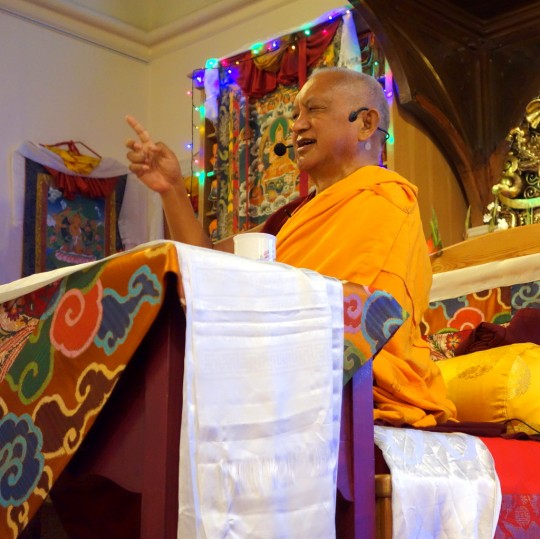
Lama Zopa Rinpoche teaching at Jamyang Buddhist Centre, London, July 2014. Photo by Ven. Roger Kunsang.
“Whatever we are doing, in our everyday life or our Dharma practice – listening, reflecting and meditating – our basic motivation, our attitude, has to be compassion,” Lama Zopa Rinpoche taught during the 24th Kopan Course in 1991. This teaching is featured in the Lama Yeshe Wisdom Archive’s June 2014 E-letter. “Here we’re not just talking about partial compassion, compassion toward somebody who loves us or a friend – except when that friend has a problem – but compassion to strangers and enemies as well. Compassion toward all sentient beings should be the motivation for why we study the Dharma, why we do anything. That should be our motivation as much as possible for every action we do every twenty-four hours.
“Compassion is so important in order to achieve peerless happiness, full enlightenment, for the sake of all sentient beings. Even without talking about enlightenment, just concerning our day-to-day happiness, there’s the need for compassion. Happiness in our daily life depends on compassion; peace in our daily life depends on compassion, on us having compassion toward others and others having compassion toward us. Generally speaking, happiness depends on each other.
“Why does each of us need to generate compassion? First of all, what other sentient beings want is happiness; what they do not want is problems, suffering. And that is dependent on conditions, on whether we have compassion or not for them, whether we stop actions that disturb them, that give them harm, and whether we do actions that benefit them. Without compassion, with the ego, the self-centered mind, the self-cherishing thought, out of that mind we do actions that harm them. So others’ peace, others’ happiness is also dependent on our own attitude, our own actions. That’s why we all need to develop compassion. …”
You can read the entire teaching “Why We All Need to Develop Compassion” and sign-up to receive the monthly E-letter from the Lama Yeshe Wisdom Archive by visiting the Archive’s website at https://www.lamayeshe.com.
More information, photos and updates about FPMT spiritual director Lama Zopa Rinpoche can be found on Rinpoche’s homepage. If you’d like to receive news of Lama Zopa Rinpoche via email, sign up to Lama Zopa Rinpoche News.
- Tagged: advice, lama zopa rinpoche
- 0
1
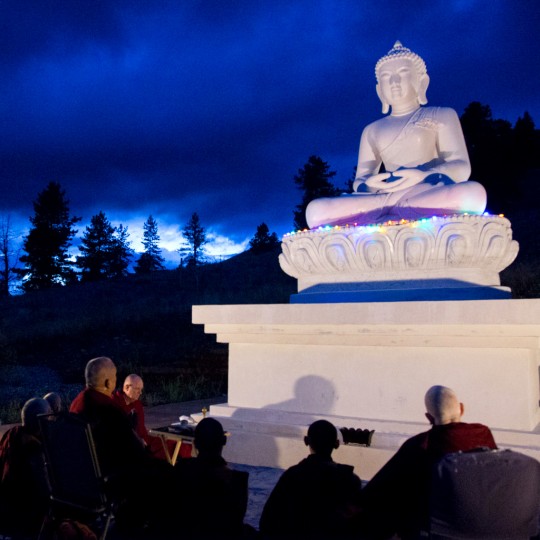
Lama Zopa Rinpoche and Sangha making prayers in front of new Amitabha Buddha statue at Buddha Amitabha Pure Land, Washington, US, July 2014. Photo by Ven. Thubten Kunsang.
Lama Zopa Rinpoche has offered new advice this week to bring peace to Israel and Palestine:
“1. [The] Golden Light Sutra – this is the best one to read at this time; this brings healing for the whole area,” Rinpoche’s advice begins. “It helps to not be controlled or have the country taken over by another, it gives power to the leader. I checked and it is more powerful to have the Sutra of Golden Light recited by the monks in the monastery, it is more effective. So sponsor Gaden Lachi (Gaden Shartse and Jangtse together) to read the Golden Light Sutra. Request the monks to deeply dedicate for Israel and Palestine to have peace. …” You can find the complete “Advice Regarding the Israel and Palestine Situation” as a PDF.
FPMT Education Services has created a page for the Sutra of Golden Light, which contains advice on the benefits of the sutra, links to PDF downloads of the sutra in 14 languages, and audio MP3s of an oral transmission of the sutra by Kirti Tsenshab Rinpoche.
In the advice, Rinpoche suggests recitation of the White Umbrella Deity (Sitatapatra) praise. FPMT Education Services makes available “A Praise and Repelling Practice of Sitatapatra” and “The Supreme Accomplishment of Sitatapatra” as PDFs.
More information, photos and updates about FPMT spiritual director Lama Zopa Rinpoche can be found on Rinpoche’s homepage. If you’d like to receive news of Lama Zopa Rinpoche via email, sign up to Lama Zopa Rinpoche News.
- Tagged: advice, golden light sutra, israel, lama zopa rinpoche, palestine
- 1
31
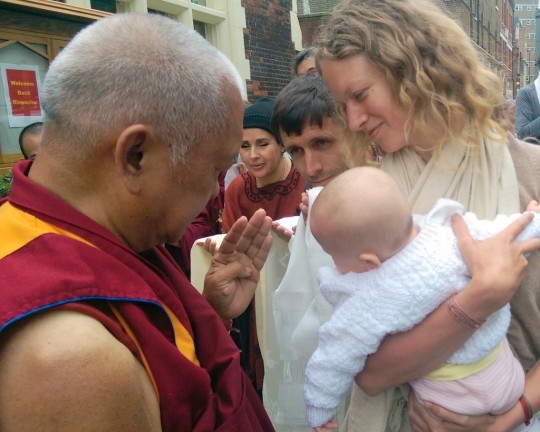
Lama Zopa Rinpoche blessing a baby upon arriving at Jamyang Buddhist Centre, London, UK, July 2014. Photo by Ven. Roger Kunsang.
Lama Zopa: practicing Dharma is giving yourself happiness!
– From Ven. Roger Kunsang’s Twitter page, posted on July 11, 2014
Ven. Roger Kunsang, Lama Zopa Rinpoche’s assistant and CEO of FPMT Inc., shares Lama Zopa Rinpoche’s recent pith sayings on Ven. Roger’s Twitter page. (You can also read them on Ven. Roger’s Facebook page.)
More information, photos and updates about FPMT spiritual director Lama Zopa Rinpoche can be found on Rinpoche’s homepage. If you’d like to receive news of Lama Zopa Rinpoche via email, sign up to Lama Zopa Rinpoche News.
- Tagged: lama zopa rinpoche, twitter
- 0
30
While staying near Madison, Wisconsin, US, Lama Zopa Rinpoche offered advice for the wildfires that were burning in Washington State, close to a number of students’ homes. Ven. Roger Kunsang, Rinpoche’s assistant and CEO of FPMT International Office in Portland, Oregon, scribed this advice for students eager to help:
1. Lama Zopa Rinpoche said that it is best to visualize the Lama Chöpa merit field and a great stream of nectar coming from the merit field and putting out the fires and especially helping the insects and animals who are suffering and perishing in the fire. This is best done in the context of doing the whole Lama Chöpa, if you have time.
Showers of nectar pour down purifying the negative karma of the suffering sentient beings, those who are suffering from the fire, and in general, the six realms sentient beings who are suffering, as well as those who have been harmed or destroyed in the fire. Also, the nectar is pouring down and changing the karma and the minds of the nagas, dergye (harmful spirits) and landlord beings, changing their negative minds, in order to not harm anymore.
It’s very important that one has one-pointed refuge in the merit field while doing this practice and one recites the mig-me mantras while doing this visualization.
2. Doing protector prayers is very good, especially tea offering to dergye as they control the elements, so it is important to appease them. But you can’t just offer tea and do nothing with the mind; you have to generate great bliss and emptiness.
3. If possible, do the extensive Medicine Buddha practice by the Great Fifth Dalai Lama.
When doing these practices, it is important to do them with good concentration and the motivation of bodhichitta.
Colophon: Scribed by Ven. Roger Kunsang, Madison, Wisconsin, US, July 2014. Lightly edited by Mandala.
More information, photos and updates about FPMT spiritual director Lama Zopa Rinpoche can be found on Rinpoche’s homepage. If you’d like to receive news of Lama Zopa Rinpoche via email, sign up to Lama Zopa Rinpoche News.
- Tagged: advice, fire, lama zopa rinpoche
- 0
29
The Appearance of True Existence
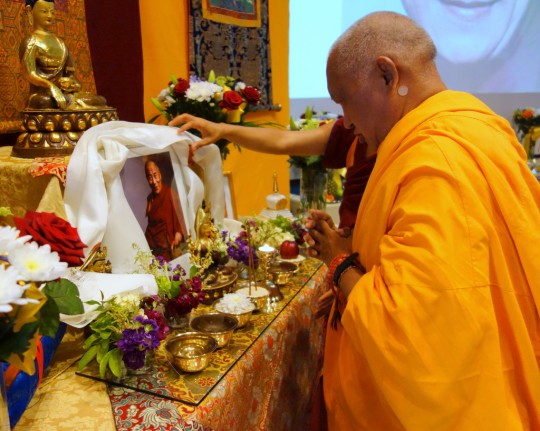
Lama Zopa Rinpoche offering a khata to a photo of His Holiness the Dalai Lama on His Holiness’ birthday, Jamyang Buddhist Centre Leeds, UK, July 6, 2014. Photo by Ven. Roger Kunsang.
More than 200 people attended the teachings organized by Jamyang Buddhist Centre Leeds. According to Ven. Roger Kunsang, “Rinpoche’s teachings were stressing the importance of emptiness.”
“We ordinary beings who haven’t realized emptiness don’t see things as similar to illusions,” Rinpoche told Ven. Thubten Chodron during an interview in 2005. “We don’t realize that things are merely labeled by mind and exist by mere name. Generally speaking, we don’t see the mere appearance of the I until we become enlightened, because whenever our mind merely imputes something, the next second the negative imprint left on the mental continuum by previous ignorance projects true existence. In the first moment, the I is imputed; in the next it appears back to us as real, as truly existent, as not merely labeled by mind.
“Until we achieve enlightenment we have this appearance of true existence. Except for the meditative equipoise on emptiness of an arya, all other consciousnesses of sentient beings have the appearance of true existence. During an arya’s meditative equipoise on emptiness things don’t appear truly existent. It is without the dualistic view (in two senses, first) not only is there no appearance of true existence, but there is no appearance of subject and object. This wisdom mind and its object are inseparable, like water put in water. The arya’s meditative equipoise on emptiness hasn’t completely eliminated the dualistic view from the person’s mindstream forever, but it has absorbed it temporarily. That is how the wisdom meditates on emptiness. It realizes emptiness directly, becoming inseparable from emptiness. …”
You can read more from the “Interview on Emptiness” on the Lama Yeshe Wisdom Archive.
Video recordings of Rinpoche’s teachings in Leeds, UK, are available at: https://new.livestream.com/
More information, photos and updates about FPMT spiritual director Lama Zopa Rinpoche can be found on Rinpoche’s homepage. If you’d like to receive news of Lama Zopa Rinpoche via email, sign up to Lama Zopa Rinpoche News.
- Tagged: emptiness, lama zopa rinpoche
- 0
28
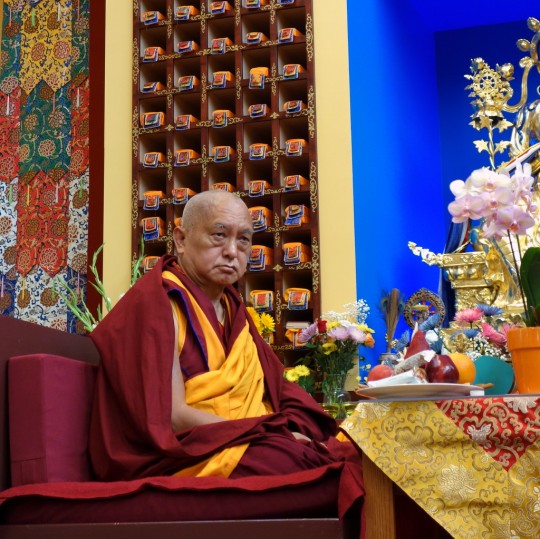
Lama Zopa Rinpoche at long life puja for Geshe Sopa Rinpoche at Deer Park Buddhist Center, Wisconsin, US, July 20, 2014. Photo by Ven. Roger Kunsang.
“[T]here’s no outside enemy. There’s a reason why people give harm to us, get angry with us or criticize us. There’s a reason, there’s a cause for that, and that cause is our mind,” Lama Zopa Rinpoche instructed. “For anybody, in any situation, even if a mosquito is biting us, the cause is our mind – attachment, anger, and of course no question about the root, ignorance. There’s no question, that’s the root. Ignorance – the concept holding things, the I and the aggregates as truly existent, which means the self-cherishing thought – that’s the real root.
“In the past we harmed others with these negative thoughts. We made mistakes, we did unrighteous actions and harmed others. What is happening now is the result of that. This mosquito biting us, that person who doesn’t like us even from the first time he saw us, that person who scolds us, even that unknown person who gets angry at us though we’ve never met before – all these things are just results, just creations of this mind. They are caused by this mind, by these negative thoughts, especially the self-cherishing thought.
“Actually, all these things are just like tools used by the people who are angry at us or who criticize us. All these things are like tools. The real enemy is our own self-cherishing thought, this ego, this ignorance, which causes anger, attachment and these delusions. The other things are like tools, like the stick that an angry person beats us with. The real reason is our own negative thought.
“It is very helpful to remember this when somebody is angry with us, scolding us or talking about our mistakes. If we can remember this at that time; that the situation is a tool, used by these negative thoughts. This is happening now because in the past we harmed that person, we did some wrong action to that person. The harm they are doing now is just a tool. The main enemy is our own negative mind.”
From Lama Zopa Rinpoche’s teaching “Don’t Get Angry at the Stick,” given at Kopan Monastery in 2008 and recently posted on the Lama Yeshe Wisdom Archive.
- Tagged: advice, lama zopa rinpoche
- 0
- Home
- News/Media
- Study & Practice
- About FPMT Education Services
- Latest News
- Programs
- New to Buddhism?
- Buddhist Mind Science: Activating Your Potential
- Heart Advice for Death and Dying
- Discovering Buddhism
- Living in the Path
- Exploring Buddhism
- FPMT Basic Program
- FPMT Masters Program
- FPMT In-Depth Meditation Training
- Maitripa College
- Lotsawa Rinchen Zangpo Translator Program
- Universal Education for Compassion & Wisdom
- Online Learning Center
- Prayers & Practice Materials
- Overview of Prayers & Practices
- Full Catalogue of Prayers & Practice Materials
- Explore Popular Topics
- Benefiting Animals
- Chenrezig Resources
- Death & Dying Resources
- Lama Chopa (Guru Puja)
- Lama Zopa Rinpoche: Compendium of Precious Instructions
- Lama Zopa Rinpoche: Life Practice Advice
- Lama Zopa Rinpoche Practice Series
- Lamrim Resources
- Mantras
- Prayer Book Updates
- Purification Practices
- Sutras
- Thought Transformation (Lojong)
- Audio Materials
- Dharma Dates – Tibetan Calendar
- Translation Services
- Publishing Services
- Teachings and Advice
- Find Teachings and Advice
- Lama Zopa Rinpoche Advice Page
- Lama Zopa Rinpoche: Compendium of Precious Instructions
- Lama Zopa Rinpoche Video Teachings
- ༧སྐྱབས་རྗེ་བཟོད་པ་རིན་པོ་ཆེ་མཆོག་ནས་སྩལ་བའི་བཀའ་སློབ་བརྙན་འཕྲིན།
- Podcasts
- Lama Yeshe Wisdom Archive
- Buddhism FAQ
- Dharma for Young People
- Resources on Holy Objects
- Ways to Offer Support
- Centers
- Affiliates Area
- Teachers
- Projects
- Charitable Projects
- Make a Donation
- Applying for Grants
- News about Projects
- Other Projects within FPMT
- Support International Office
- Projects Photo Galleries
- Give Where Most Needed
- FPMT
- Shop
Subscribe to FPMT News
Translate*
*powered by Google TranslateTranslation of pages on fpmt.org is performed by Google Translate, a third party service which FPMT has no control over. The service provides automated computer translations that are only an approximation of the websites' original content. The translations should not be considered exact and only used as a rough guide.If you follow self-cherishing thoughts, those thoughts become your identity. Then anger, pride, the jealous mind – all this negative emotional stuff arises. When you let go of the I and cherish others, negative emotional thoughts do not arise. That’s very clear. Anger does not arise at those you cherish.







